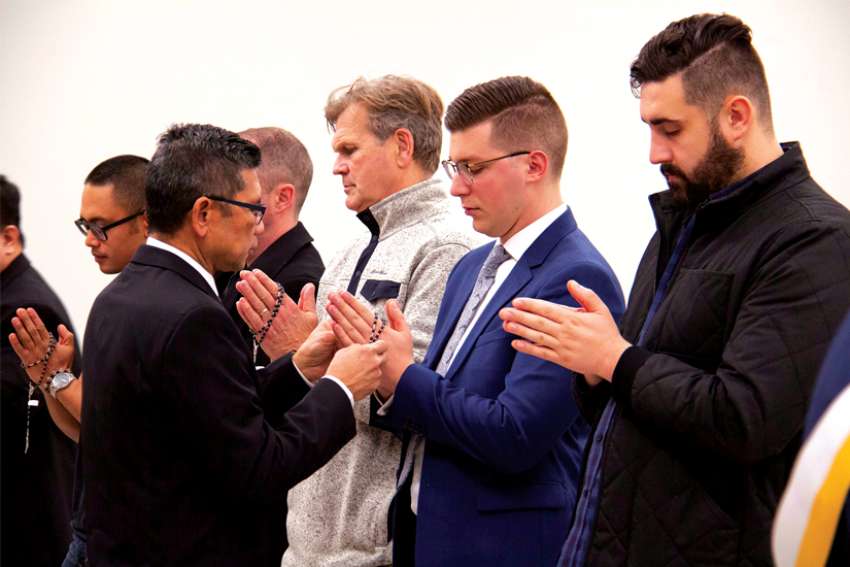The Knights of Columbus has simplified its initiation ceremony and for the first time now allow families and non-Knights to participate. The veil of secrecy that had surrounded initiation ceremonies for the past 142 years has been lifted as the fraternal Catholic men’s organization attempts to showcase the order’s core principles and that it’s more inviting to new members.
“The doors are wide open. Anybody can come and watch, they don’t even have to be Catholic,” said Marcel Renaud, state treasurer for the B.C. and Yukon district of the Knights of Columbus. “We’re hoping men who are not yet members of the Knights can come and watch the ceremony and say: ‘Yeah, I want to be a part of that. This is what I am looking for.’ ”
Since the Knights were founded in 1882, new members have had to participate in a series of confidential initiation ceremonies that were often more than an hour long, used heavy, “archaic” language and could be spaced months or years apart. The first degree focused on the Knights’ principle of charity, the second on unity and the third on fraternity. Later, a fourth degree was added: patriotism.
Each degree utilized its own, unique ceremony, which Renaud explained was only open to Knights so it would be an impactful experience for new members every time.
“That was a great idea in the 1880s. Even in the 1980s. But not today. It tarnished us in that it gave people the idea that we were a secret society. We’ve never been,” said Renaud.
As of Jan. 1, all of that changed. The first three degrees have been wrapped up into one 30-minute ceremony called the Exemplification of Charity, Unity and Fraternity. The language has been updated to modern English and anyone can attend.
As with changes to any longstanding tradition, the Knights were expecting some blowback. But in a little over a month since its initiation, the Knights are seeing wide acceptance.
“It’s been very well accepted,” said David Peters, Ontario State Deputy, who has attended a dozen exemplification ceremonies across the province since Jan. 1. “They love the new exemplification.”
The Knights understood this is how things need to be if they are to attract younger members in this day and age, said Peters.
“In the past, they use to do everything in the whole day. They’d start at eight in the morning and it would go on to six in the evening,” said Peters. “In today’s world with the younger members, you know they can only afford so much time. They get bored when it’s too long or elongated kind of ceremonies. But today’s ceremony has brought the whole meaning of the three principles together. It’s so much more attractive to these younger members.”
It’s also made things easier for local parishes and councils to conduct the ceremonies, he said.
The first exemplification ceremonies in the B.C. and Yukon district were held in late January in Surrey and Maple Ridge, with 74 men becoming third degree Knights. The uniquely Catholic ceremony (which took about two years to update) included prayer, reflections on the principles of charity, unity and fraternity, and solemn presentations of new rosaries and pins to the men.
A Knight for 26 years, John Work said the new ceremony will take some getting used to.
“There were some special parts of the degree that I’m sorry aren’t there anymore,” he said. “There were beautiful degrees and after doing them for so long, it’s hard to let them go. I’m going to have those in my memory banks for the rest of my life.” But, he added, “it’s time.”
The Knights have made a number of efforts in recent years to gain new members as the order had begun to stagnate. While the numbers remained relatively steady, there were fewer younger men joining the Knights. A number of new initiatives have been launched recently, including about two years ago the launch of online membership. Renaud said those who joined online would receive regular e-mails about various activities the Knights are involved in and a chance to join a local branch in person.
“For every three men who join us online, two will join a council,” he said. “That’s amazing. It’s another sign the Knights are stepping forward.”
Last year, the Knights also updated their Fourth Degree uniform, replacing the familiar cape and feathered chapeau with a jacket and beret. Studies the Knights have done showed that many younger men were turned off by the ceremonial regalia of fourth degree Knights. While it met significant resistance, as most changes do, it was also met with significant buy-in from members, as witnessed by the demand for the new regalia when it was introduced July 1.
Such efforts to modernize the Knights seem to be working. Peters said since he took over as State Deputy July 1, the Ontario Knights have attracted almost 1,000 new members — its mandate for the year is to recruit 2,000 new members — including in early February the opening of a new council at Ottawa’s Carleton University. This came on the heels of a Spanish council opening in St. Catharines the month before.
The Knights of Columbus has nearly two million members across the globe, making it the largest group of lay Catholic men worldwide. Their activities include charitable works and fundraising (they gave $186.7 million to charities in 2018), volunteering at parishes, selling insurance and supporting vocations to the priesthood.
(Files from The Catholic Register and The B.C. Catholic)


